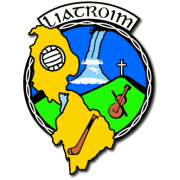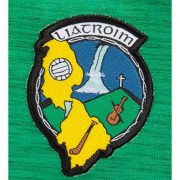A zest for life and a love for Leitrim
A zest for life and a love for Leitrim
By Ewan McKenna
A look out the front-room window explains a lot.
Crane your head a little and you can see the house where the legendary Packie McGarty grew up. “He was supposed to have been a good one,” comes a response laden with the sort of understatement only people from these parts can carry so effortlessly. In the other direction, there’s the circle chalked on the wall where the three McGuinness brothers honed their skills as kids.
“There wasn’t much else to do,” notes John, who, at 32, is the eldest. “Kick a ball, it’d get dark and that’d be that.” Then, up near enough to their mother’s house, is their father’s grave. Michael senior, who passed away in 1997 aged 50, was full-forward on the Leitrim Team of the Millennium. “He was good too,” laughs John. “At least that’s what he told us.”
Given the surrounds at the top end of Mohill, it’s no great surprise all three of the boys lined out for the county for years but “we aren’t the Ó Sés” warns John. Sitting across the room, Michael junior nods in agreement but there’s no third voice. Instead there’s just the past tense and a casket of memories as up near their mother’s house lies another grave. Philip’s. It’s only a teardrop over two years since the then 26-year-old went for a ball in a club match, caught a knee to the head and was killed.
“To an extent, I haven’t really grasped it,” says 31-year-old Michael. “Sometimes you just expect he’s going to come in the door and grab a gear bag.”
They said Philip inherited the sort of devilment his father used to carry around the village. Back in his heyday, Michael Snr was the local prankster. One evening when old Pascal McKeon, who ran a bar that was a centre for packages and post, went out back, McGuinness saw a parcel full of baby chicks unattended. He let them loose and took great joy in watching the publican chase them around the bar. Not a bad bone though, and that was passed onto his youngest son as much as the football.
John brightens up at the thought of Philip rushing through the door with a tale from training not long ago. “Declan Maxwell is like Hannibal Lector, a beast,” John recalls. “And Declan had fractured his baby finger and Dessie Dolan asks him to join in for a lap. Declan says he couldn’t because ‘he didn’t want to stress the fracture’. Philip thought it was hilarious, especially since Philip was a guy that would crash into bigger players all day. You’d be watching him through closed fingers half the time.”
There was plenty of other fun knocked out of it all too. Long before he joined the Leitrim set-up, Philip was studying in Dublin and nights out were expensive. Yet when Michael was invited up with all the other man-of-the-match winners across a season of Sundays, he told Philip to bring some friends and pretend he was the county player. So he drank with stars all evening and when he went up to collect the award, it went unnoticed. They just clapped another nobody from a nowhere county.
“The joys of being a Leitrim footballer,” notes Michael. “But Philip loved it.” He had to. Working as an engineer on the Corrib gas line (“exactly what he did I have no idea, he didn’t exactly bring his work home with him”), twice a week he drove back from Belmullet for training. The five-hour round trip cost him a couple of speeding tickets, but no matter. Before he was killed, Mickey Moran and John Morrison were getting the best out of him and life was good.
“He loved Leitrim as much as any guy in Dublin or Kerry loves playing for their county,” says John. “Playing for Leitrim mattered to him. It had to because, realistically, you’ll never win anything. I was lucky I won a Connacht minor title in 1998 but thenÓgot a wake-up call in the semi. We arrived up to Croke Park in trainers and tracksuit bottoms covered in cowshite. Tyrone had three-piece suits. I can go one better. Have you been to Aughrim? An awful swamp. I played a league match about 10 years ago, went for a ball with no one near me and the cruciate went.
“I fell over and started sinking. Honestly. Sinking. Fast cars, fast women and fast food. It’s not how county football was meant to be yet Philip was very proud to be a part of it. His last county game was an awful defeat down in Limerick. I remember slagging him and asking if there was a slow clap when they scored. It wouldn’t have dampened his enthusiasm though. Sure aren’t Leitrim always competitive in championship.”
Michael looks at John and has his own high-flying tale about the day Dessie Dolan needed him to mark Matty Forde in Wexford but he was finishing exams. “He offered a helicopter. I thought, ‘Yeah!’ How many chances will you get to do that.” “Hang on, this wasn’t like Black Hawk Down,” interrupts John. “This was a bucket with a lawn mower engine attached.”
They both laugh again and then both agree.
“It was something special to play with Philip,” continues Michael. “I remember achampionship match, I had been struggling with injuries and was marking Senan Kilbride. Once or twice I boxed the ball away and Philip was back collecting it. It was really hot and I was thinking, ‘thank God he is here’. You’d sometimes remember the three of us as kids when we won Connacht in 1994. We all stormed the Hyde pitch. There was a banner somewhere reading ‘Would the last person out please switch off the lights’. After that, Philip knew our father was big into football and associated doing well as kind of a legacy of our father. Football brought so much happiness to us all.”
All those strands made up the Philip McGuinness they remember getting ready to play just another local league game for Mohill against Melvin Gaels on Apr 17, 2010.
The last memories Michael has are of him bounding around the place in the hours leading up to that game. He ran into the house, grabbed some gear and took off to collect a teammate. Then, down at the field he was offering advice, telling Michael if he had a run onÓgoal, not to cut back on himself. The two laughed when Michael told him that was the exact opposite to what John had said. Then it was game time.
“I saw the tackle and heard something, like something broke,” says Michael. “I didn’t think it was serious. A high ball, him and his man jumped, it fell down in front of them, he went down and there was a man coming running in. He went forward into the guy’s knee. But even when he didn’t come around, I didn’t think it would be serious. If you told me he wouldn’t be up in a day or two, I wouldn’t have believed you. I went over and was trying to get his gum shield out and his jaw had locked. I pulled it out and his jaw snapped back. He was breathing funny. In a ball on one side.”
By the time a doctor arrived 15 minutes later, Michael was still telling people to give his brother room. By the time an ambulance arrived 50 minutes later, Michael had togged in, sent a lift for his mother and called John, who was on a stag inÓgalway. He said he’d meet them in Sligo Hospital. But what he found there was sobering. The Glasgow Coma Test gives an initial assessment as to the wellbeing of an unconscious person, Scóring them one to four on basic eye skills, one to five on verbal skills and one to six on motor skills. Three is the lowest and anything less than eight is severe. Philip scored four and doctors said to the family, even if they could wake him, he’d never be the brother and son they’d known.
“They brought him off to do a CAT scan and there was really massive damage to the side of his head,” remembers Michael. “They explained the skull was so badly fractured that the brain was swelling, it had nowhere to go and would push hard on the spinal cord and do damage to the base of the skull. He’d be brain dead then. You hold out hope when they said they’d take him to Beaumont and anything that could be done would be done. But it was there he died.”
“Awful fucking thing to be hit with. Anyway,” sighs John. “It worked out grand, his friends got to see him in Dublin. You can’t take many positives from something like that but he would have been glad that anyone who ever thought anything of him got to see him. He’s buried just up the road. That’s another thing to be thankful for. We go up to the grave every evening and have our private moments.”
As for their mother, she is doing as well as can be expected. Michael notes her faith has been a huge help but if so much was passed from father to son, this was a maternal trait Philip received.
“When I came home after it was all over, I went up to my room and he’d left his jeans there. I was going through them and found a little bottle of holy water and a thing from Medjugorje for saying a decade of the rosary. That surprised me. But now we are talking about it, it’s just bizarre to think the lad isn’t still around.”
All those strands made up the Philip McGuinness they try not to remember as he never came home from just another local league game for Mohill against Melvin Gaels on Apr 17, 2010. “I try not to dwell on it,” says Michael. “I was thinking a few days ago, he was so happy. He’d bought the car John is driving, things had worked out for him. He’d been playing great stuff and the year before, a lot of the papers said he was man of the match against Roscommon. So a lasting memory I try to keep was him like that.”
It makes sense because he was always like that. Both brothers say the day they all played together in a league game against Roscommon didn’t matter much at the time, but it matters now. Then there’s the county title from 2006, the club’s first since 1971, when their father starred.
“Unachievable from the way the auld fellas around town would go on about it,” smiles John. “So the place went wild. We were on the beer for a week. Heroic stuff. A battle fought on many fronts. We went training the Thursday and four showed up. We played Corofin a fortnight after but the three of us had some good times in between.”
Philip hurled too. Hurled well. “With Gortletteragh,” continues John. “We had a club here for a while but not only could they not pick up the ball, they couldn’t hit it. So they’d be kicking it up and down on the ground. But once he made it with the county it was all about football for Philip. Not easy being a dual player in Leitrim. But he’d never let you down, would never pull the chest in. He loved big days.”
And they loved having him on big days. “Sometimes you’d be out playing a match and be backed into a corner and just wish he was there because he’d get you out of it,” they sigh. “Sure he was a bit like that away from football too.”
Article courtesy of the Irish Examiner – Saturday, June 02, 2012
14-Aug-12 by Colette Fox – PRO




